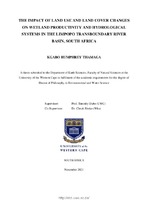| dc.description.abstract | Wetlands are highly productive systems that act as habitats for a variety of flora and fauna. Despite their ecohydrological significance, wetland ecosystems are under severe threat as a result of environmental changes (e.g. the changing temperature and rainfall), as well as pressure from anthropogenic land use activities (e.g. agriculture, rural-urban development and dam construction). Such changes result in severe disturbances in the hydrology, plant species composition, spatial distribution, productivity and diversity of wetlands, as well as their ability to offer critical ecosystem goods and services. However, wetland degradation varies considerably from place to place, with severe degradation occurring particularly in developing regions, such as sub-Saharan Africa, where Land Use and Land Cover changes impact on wetland ecosystems by affecting the diversity of plant species, productivity, as well as the wetland hydrology. | en_US |

